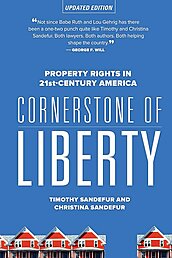Published in the wake of the Supreme Court’s landmark decision in Kelo v. New London, Cornerstone of Liberty: Property Rights in 21st Century America made a powerful contribution to the firestorm of interest in protecting property rights. Now in its second edition, Cornerstone of Liberty has been fully updated by authors Timothy and Christina Sandefur, and examines how dozens of new developments in courtrooms and legislatures across the country have shifted the landscape of private property rights since 2005. Through a combination of real-life stories and solid legal analysis, the authors explain how key issues like eminent domain, civil asset forfeiture, and environmental protection regulations have evolved and how they should be reformed. Brand new topics, such as the sharing economy and the Koontz case, are popular, timely, and addressed by the authors in this revised edition. This book shows why the right to ownership is one of the most essential of human rights, how that right is protected in the U.S. Constitution, and how ordinary property owners can help rein in government violations of private property rights.
Cornerstone of Liberty: Property Rights in 21st Century America
Praise for the book
“Not since Babe Ruth and Lou Gehrig has there been a one-two punch quite like Timothy and Christina Sandefur. Both lawyers. Both authors. Both helping shape the country.”
—George F. Will
Praise for the First Edition:
“This timely and compelling book will greatly interest anyone seeking a better understanding of the state of property rights in America today. Concerned citizens and activists will find resources and inspiration in each chapter.”
—Chip Mellor, President, Institute for Justice
“Timothy Sandefur demonstrates why private property rights are central to a stable society and economic freedom, and what steps we can take to protect those rights in the wake of the Supreme Court’s Kelo decision.”
—Sen. John Cornyn (R‑Texas)
“For many lawyers and economists, private property is an abstract institution justified for its long-term social advantages. But for Tim Sandefur, property lies at the heart of every individual’s personal identity and self-worth. Read his harrowing accounts of what happens when property rights are trampled here at home, and you see that the human dimension of property rights cannot be neglected in an ongoing debate that shapes the future well-being of our nation.”
—Richard Epstein, University of Chicago Law School
“In this timely volume Timothy Sandefur convincingly documents the importance of property rights to a free society, as well as the intellectual and political assaults on the rights of property owners starting in the Progressive Era. Sandefur offers constructive suggestions for legal changes that would enhance the rights of owners and restore the vision of the Framers that linked property with individual liberty. This book is a welcome addition to the growing literature on economic rights.”
—James W. Ely Jr., Vanderbilt University Law School
“Reading Tim Sandefur’s excellent new book helps highlight how the Kelo decision betrays, and arms those who continue to oppose, America’s efforts to erase racially imposed economic disparities within our society.”
— Dennis Hayes, General Counsel, NAACP, Baltimore, Maryland
About the Authors
Timothy Sandefur is an adjunct scholar at the Cato Institute and a principal attorney at the Pacific Legal Foundation, a nonprofit organization dedicated to defending property rights and economic liberty. He is the author of The Right to Earn a Living: Economic Freedom and the Law (2010) and The Conscience of the Constitution (2014). He is a graduate of Hillsdale College and Chapman University School of Law.
Christina Sandefur is vice president for policy at the Goldwater Institute, where she develops strategic plans to transform public policy ideas into real-world results and litigates cases advancing economic liberty, private property, free speech, and taxpayer rights. She is a graduate of Hillsdale College and Michigan State University College of Law.
